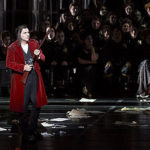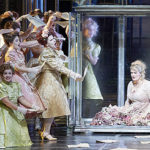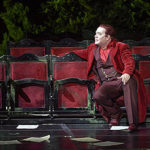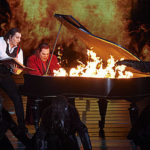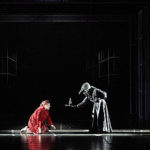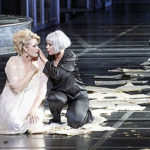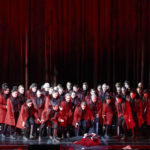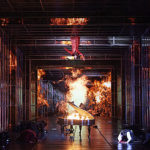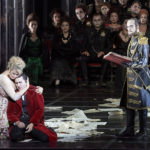How does a modern director (Christian Räth) stage this for a post-modern audience? Räth’s new production for Vienna State Opera wisely stays in the 19th century. but Gary McCann’s staging uses special effects to play up the supernatural. (Aren’t we all obsessed with vampires and horror flics?) Unfortunately director Räth complicates things. So Max, in the introduction, is a romantic composer of the time: like Berlioz in his Symphonie Fantastique, Max appears to have visions and hallucinations. As if the story is something he’d dreamed up. And this ‘framing’- in spite of a brilliant production – has confused audiences.
The computerized graphic target range – background to the Overture- is more in the realm of sci-fi than 19th century ghost story; while Tomas Netopil’s Vienna Sate Opera Orchestra reminded us of the originality of Weber’s music.
But then Andreas Schager’s Max, at a grand piano, is assembling his notes; and with exaggerated gestures lays the pages out on the stage, marking this as comedy: maybe a (Dudley Moore) spoof? Then a sensation! The stage opens out: a Victorian lecture room or concert hall, mirrored walls, a crystal palace. Facing us, a seated audience, dressed in black evening dress, break into a choral rehearsal. Glorious! The choir, Vienna State Opera’s, is inviting us to come to ‘the shoot.’
‘Anyone who constantly misses the target gets teased’: Schager is jostled by the people’s favorite Kilian (Gabriel Bermudez.) Then Cuno, (baritone Clemens Unterreiner) explains the tradition of the ‘trial-shot’ Probeschütz: how a poacher once used his ‘free bullet’ to shoot a deer; “six bullets will hit the mark, the seventh being the devil’s.”
Max knows what’s at stake. Schager sings, in his aria, giving up all hope of winning Agatha. Schager’s expressive tenor movingly conveys the Romantics’ ardour and despair. Misfortune seems to dog him.
Then on a stage resembling a 19th century lodge, Caspar walks on, Alan Held in a scarlet red velvet frock-coat, his hair tied in a pig-tail at the back, a Dracula-like figure, the face a ghostly white. This is no parody, the guy is frightening . Agathe (Camilla Nylund), the object of both rivals, in her aria, sings lyrically, she can no longer bear the waiting: a pastoral of walking through the woods. Nylund, a distinguished Straussian soprano, is outstanding as the innocent, against her lover unwittingly caught in a Faustian pact.
Caspar, wearing white make up, not unlike Christopher Lee’s vampire, pushes Max down and pins him to the floor- as if to give him a vampire bite. The setting is now a forest. Caspar, who lends Max his gun, forces him into trying an impossible shot; and Max shoots an eagle down. Do you know what a Freischütz is ? Max lacking the confidence to win the trial shot, begs Caspar for a a magic bullet to win Agatha.
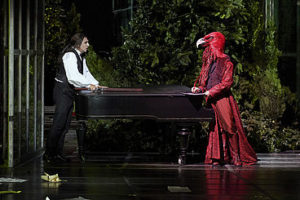
Wolf’s Glen at midnight. Caspar, Held’s vampire figure, looms over him: nothing can save you now from a terrible downfall, he gloats. Schweig, schweig. Black spectres stalk the stage, human bodies with raven heads. Triumph, vengeance is mine! Räth’s production, which at first seemed tongue-in-cheek, is now deadly earnest, rather frightening.
Against this machismo blood-lust, Nylund’s Agathe, in a charming scene with her cousin Ännchen (Ileana Tonca). Mezzo Tonca, a slight, playful figure in a black suit, injects humour trying to lighten-up her cousin. Nylund sings how differently her heart feels: who can control a bursting heart. Agathe has seen a hermit in the forest, who warns her of danger, and has given her sanctified roses. It seems that the portrait they’re re-arranging, Cuno’s, fell at the same time as Max shot the eagle. Nylund, dressed in white with a golden stole, sings of stolen glances; how she can’t sleep without seeing him, her aria superbly sung. Meanwhile, a figure in a silver gown with a dove’s heads shadows her, begging the angels to guide Max safely home.
Gruesome iron-headed figures in black; an eagle with a gaping wound is dragged across – ghastly, bloodied – the darkened stage; thunder and lightning erupt. Caspar raises-up Samiel (Hans-Peter Klammerer) and bargains with him in exchange for Max. Seven magic bullets: the seventh for the devil. Will he be sufficient for you? A voice, as if from the very depths of hell – Klammerer’s bass- Es sein. But where is Max? Schager sings, what a dreadful abyss; his heart is filled with terror, but he must go on. He shot the eagle; he can’t turn back.
The staging is truly remarkable, Max, Schager’s black silhouette, as if reflected through mirrors. The stage swarms with devilish agents, heads as raven’s beaks. Caspar calls on the devil. With the seven bullets cast, spectres rise up and tempests rage. With the seventh bullet, Samiel (in a red cloak) somehow hangs upside-down from the glass ceiling, Klemmerer’s voice truly spooky. (Is it a hologram, you think?) He reaches for Max’s hand, and Max makes the sign of the cross.
Down to a more human scale, Nylund sings she dreamed she was a dove, and Max shot her down; disturbingly affecting, to sublime cello accompaniment. But what if dreams come true, und ob die Wolke. Nylund, in rose-petaled dress, her face fraught with consternation, sings to Tonca, who brings her down to earth, with a story (Einst traumte). Tonca’s Ännchen, petite, a sprite-like figure, sleek-suited, darts around, dwarfed by the buxom, full-figured Nylund. Tonca conducts a girl’s chorus, singing a folk song about lavender and myrtle: the seven year wait, and the green bridle wreath.
Now the men’s chorus singing lustily of a sport fit for princes – Hunting! YO HO -TRA LA LA! .Thrilling. (I mean Vienna’s Chorus.) Now Max wears a red huntsman’s jacket. He takes his shot, the target a white dove. Agatha cries not to shoot: she is the dove. She falls, but Caspar has also fallen. She revives, Ich atmen noch , still breathing. But Caspar dies cursing both heaven and Samuel. Chorus sing , he was always a villain, Bösewicht. Ottokar, the Prince (Adrian Eröd ) prohibits the wedding. (Max confesses he resorted to magic in desperation.) The dead man deceived him. Even the pious heart can easily falter, neglecting right and duty. The hermit descends on a chandelier, (Albert Dohmen) another cameo in a very distinguished cast. Ottokar finally grants the marriage, but after a year’s penance.
The stage reverts to to Max, Schager the composer on his grand piano. Has it been a dream, fiction after all? Nylund helps him sort-out his score, and embraces him.
Whatever misgivings about the production- the framing composer narrative – the special effects for the supernatural were stunning. At one point, closing Act II, the piano seemed on fire. Personally, I thought it worked well, the updating in keeping with the (19th century) Romantics’ Gothic movement. Musically, it was a triumphant revival of Weber’s now underrated masterpiece, an affirmation of his genius. © P.R. 24.9.2018
Photos: Andreas Schager (Max); Camilla Nylund (Agathe): Alan Held (Caspar); Andreas Schager (Max), Alan Held (Caspar); Camilla Nylund (Agathe) and Daniela Fally (Ännchen); Camilla Nylund (Agathe), Andreas Schager and Adrian Eröd (Ottokar); Main text: Andreas Schager
© Wiener Staatsoper/ Michael Pöhn

